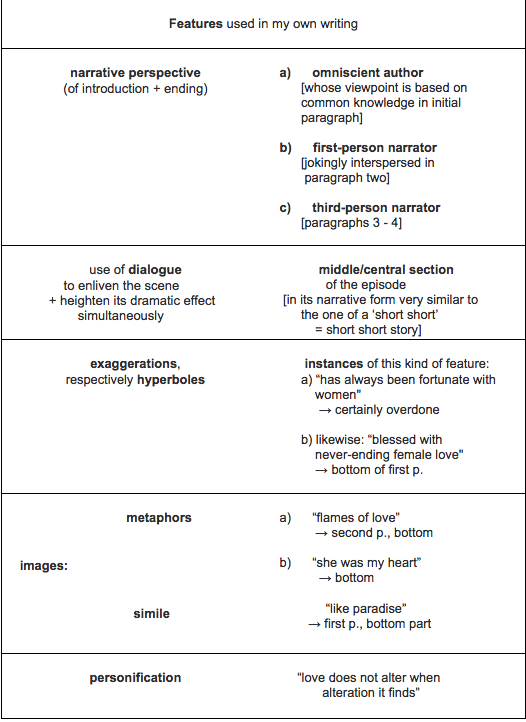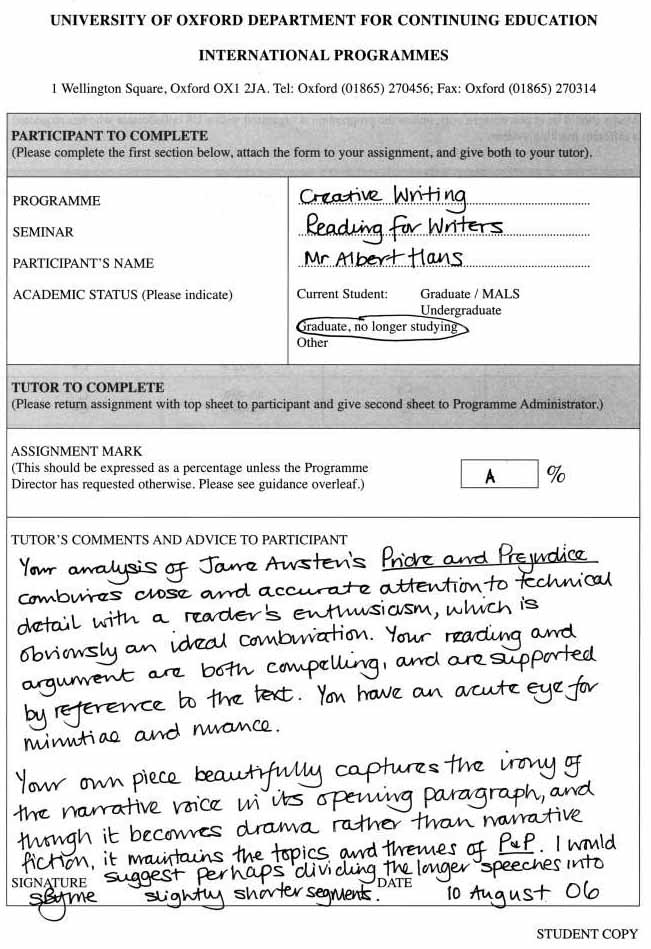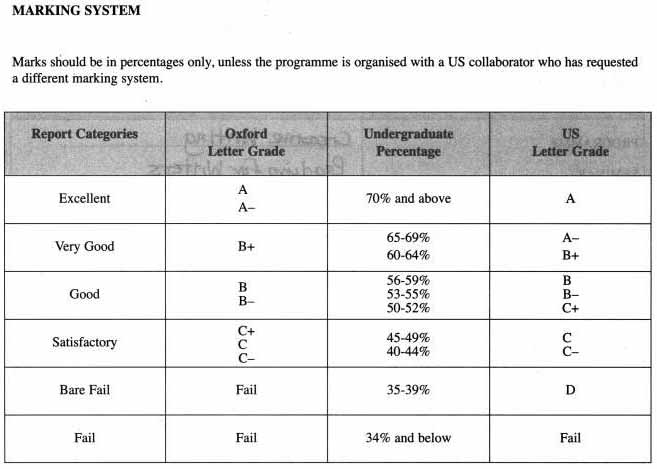Features from 'Pride and Prejudice' in a short short of mine
Reading for Writers
workshop run by Prof. Sandie Byrne
Albert Hans - assignment # 2 - submitted on August 10 / 2006
“2. Write an original piece of narrative in which you utilise the same features
(probably four) as those you have identified in the passage below. (c1000
words)”
= Creative piece of writing of my own,
based on themes/techniques/features I found
through my appreciation of the extract from chapter 1
of Jane Austen’s novel Pride and Prejudice (last paragraph excluded)
Just an Encounter
Common knowledge has it that it is not love that makes the world go round, but money. At a first glance, this sounds a bit capitalistic, upon second thought, however, and based upon one’s own experience, one cannot but admit there is a point of truth in it.
“Money is no object” is a phrase much in vogue these days and in frequent use not just of the hoi polloi, but a lot of upstarts, or should I rather say snobs, as well.
It is in this context that our two friends, for the sake of simplicity we shall call them Bill and Roy, are to be seen. Bill, a Gatsby-like figure with an athletic built, who has made money hand over fist in next to no time, yet no-one can tell for sure how, and Roy, the typical good-looking charmer, who has always been fortunate with women since he was the top banana basketball star in his high school team, though unlucky in terms of wealth.
It happened on a fine summer’s day when Bill bumped into his friend on Fifth Avenue, not far from Washington Square, the place where he had found his first love, a charming teeny cutie then, now married to a real happy-go-lucky whom he didn’t think worthy of her.
Roy: Mind your steps, old boy, and don’t be so stormy. Take your time in whatever
you do. Well, ….you seem a bit absorbed. Not quite up to normal. Do I take it
that things haven’t been going well for you? If there is anything I can do for you,
old chap, let me know. Whatever it is, I’ll give you a hand.
Bill: Sorry for knocking you over, almost, Royie boy.
I wish I were in your shoes. I’d always be in a cheerful mood, see things
positively, from the bright side of life.
I guess you know about Mary, who I got friends with about two years ago at the
Hilton New Year’s Eve party. I fell in love with her the very first moment I saw
her. She was my heart, my all and everything. All my hopes had been pinned on
her until last night she said we were through and walked out on me.
The two years Mary and me were together were like paradise. Even when I
realized recently our friendship would break down sooner or later I stuck my
expectations onto a glittering diamond I bought for her, assuming diamonds
were for ever, only to find they weren’t.
So here I am. Terribly alone again.
[Pause] …I wish I were you, the man blessed with never-ending female love.
Roy: Well, what happened to you, happens to a lot of people. I’m sure time will heal
your wounds and make you get over it. On the other hand I wish you wouldn’t
think of me like this. You know damn well I’ve had countless liaisons. All of
them ladies real dazzlers, a craze for anyone to spot them, no matter when
and where. I’ve had them all. But if I come to think of it, I wouldn’t say it
has made me happy, the way this has been going for me. I haven’t been able
to go steady with one single woman for a longer period of time. They’ve all
been temporary affairs, passing sweet nothings that have left me void of that
certain something everybody instinctively yearns for. I know what people call
me, “King of the Catwalk Beauties”. They are creative in inventing most
unsuitable labels for me. If they only knew what it is like to have never loved
in the truest sense of what love is. They love exaggerating. They like living on
preconceived ideas shaped by clichés. It is pure cliché-thinking that insinuates
to them the image of me as a womanizer. They are wrong in that. What’s
the use of being the one women take to like ducks take to water if you
don’t find the right one, the one who shares (the dimension of) your feelings,
ideas and sorrows as well? It is this unitedness on the same ‘wavelength’,
on which genuine, mutual communication is possible, that makes you happy.
A partnership, a love that “does not alter when alteration it finds” according
to one of Shakespeare’s sonnets.
Bill: You have missed your true vocation. You should have become a lecturer.
They are entitled to teach people lessons.
I thought you were a joker. How wrong I was!
As a matter of fact, your ‘sermon’ makes me aware of a good point.
I now begin to see that it is Heaven’s message to us to put up with
what we have somehow and be content with ourselves. Or, to put it with
this famous dictum by Croesus, King of Lydia in Asia Minor, renowned for his
wealth, who after his defeat by Cyros the Great of Persia is said to have
remarked to him from the top of the stake on which he was going to
be executed – not through flames of love, but by real fire:
”No-one can be deemed happy before they are dead.”
Having found solace in one another this way the two friends parted into opposite directions, cherishing at heart how precious friendship can be.
----------------------------------------------------------------------------------------------
Reading for Writers
workshop run by Prof. Sandie Byrne
Albert Hans - assignment # 3 - submitted on August 10 / 2006
“3. Give a list of the features you have included in your own writing. (Note-form)”

I publish the certificate I received for this three-divided performance in its original form so that any student from outside the UK may see for themselves what such a document looks like both in its design and rating system.
Here the front side of the certificate:

Here the transcript of my tutor's assessment:
Your analysis of Jane Austen's Pride and Prejudice combines close and accurate attention
to technical detail with a reader's enthusiasm, which is obviously an ideal combination.
Your reading and argument are both compelling, and are supported by reference to the
text. You have an acute eye for minutiae and nuance.
Your own piece beautifully captures the irony of the narrative voice in its opening paragraph,
and though it becomes drama rather than narrative fiction, it maintains the topics and
themes of P & P. I would suggest perhaps dividing the longer speeches into slightly shorter
segments.
-----------------------------
→ The reverse side of the certificate with the rating system peculiar to Oxford:


